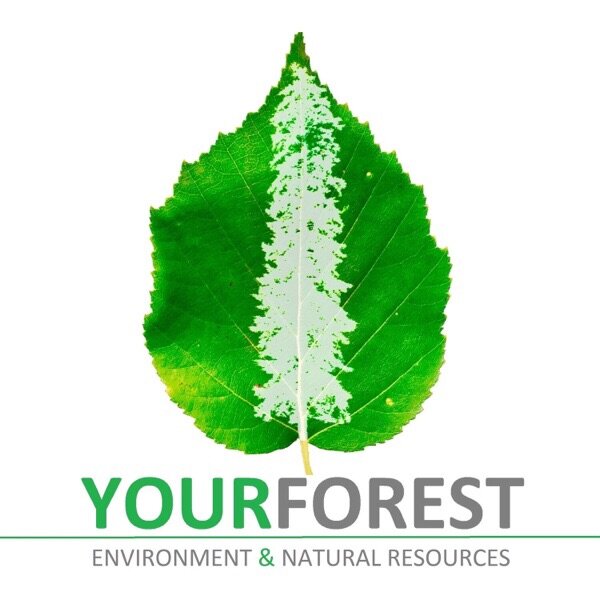I never thought I would have to talk about war as a forest disturbance. I was not prepared, nor did I have the experience or knowledge to provide any relevant feedback. This discussion really opened my eyes to the complexity and devastating nature of war as a disturbance. How even when the war is over the consequences will last generations. The ecology will be forever shifted, and the dangers of unexploded ordinances will haunt the people of Ukraine for decades to come.
Resources
Sponsors
Quotes
48.35 - 48.44: “If we just plant the status quo again, we’re just going to keep dealing with this - climate and fire fragmenting this landscape.”
51.17 - 51.29: “The river makes forests possible, the river is a great place to set up a defensive line so… forests get disproportionately affected by the war because they are near the river.”
Takeaways
Forest Ecology and Beyond (04.37)
Brian is from Maine, USA and is a forester by training. His roots lie in Eastern Europe and he decided to combine his heritage, training and language skills to work in Ukraine. He worked in forestry, biodiversity conservation and commercial forest management in Russia and Ukraine before Russia’s first invasion of Ukraine in 2014. For the last 6 years, he has been doing humanitarian and economic recovery there.
War and Fire (08.13)
Brian informs that it is the Donbas region in Ukraine which is being “systematically” destroyed due to the war. However, forest fires have also caused damage in the past there, with a third of the pine forests being destroyed in 2020. His views differ from the Ukrainian forest practitioners, but he is happy to be engaged in a scientific and management debate. He believes it is time to pivot to a different way of managing the landscape.
A large country with fascinating forests (12.24)
Brian shares that there are some Ukrainian forests free of Russian invaders but contaminated by unexploded ordinances, which complicates firefighting in the area. He believes Ukraine needs resources and support to tackle this problem. He lists the species of trees in the different forest regions of the country and the river network that spans across it. The Ukrainian steppe landscape has black earth, tall grass and martens.
Natural and economic trauma (21.04)
Brian describes how sandy steppes with groundwater depressions surrounded by deciduous trees create important biodiversity alcoves and present biodiverse broadleaf forests in the semi-arid pine landscape. Industries built around these so the increased fires due to the war have transformed and fragmented Ukraine’s landscape. He narrates the history of colonization across this landscape and the impacts it had on the steppes and pine forests.
Reforesting pines and afforesting sandy steppes (27.01)
Brian narrates how pine was used to restore the landscapes under different regimes in Ukraine but that the Russian invasion is destroying the forests. Historically, a lot of structures like mines and homes were made with pine. The debate now is how to balance climate change dynamics with the “super production intensity approach” to forestry in the country. He discusses the complications in fire management due to the varied thinning practices in the past.
Fire in the Forest (36.17)
Brian highlights the lack of trust towards foresters in Ukraine and Russia. Although there are long-standing regulations, the invasions have damaged the forests and made it a militarized zone. The unexploded ordinances, heavy artillery flying above and soldiers who burn trash or throw cigarette butts add to the possibility of fire. He believes that destroying forests is a way to “smoke out the Ukrainians”.
Restoring forests (42.37)
Brian notes that even though much of the forest has burned, some has been salvaged by intuitive demining and intelligent resource management. However, commercial forest management has become extremely difficult due to shrapnel in logs. Massive forest fires and drought have dried up the landscape and seen mortalities. Ukrainian wildfire experts say that such fast-moving fires need to be caught in the first hour.
Firefighting in war-torn landscapes (50.10)
Brian talks about the considerations around hydrology to improve the landscape but the river network being used by Russian invaders complicates this possibility. Going forward, he believes a creative fire management approach will be needed where people have the right to fight fire wherever it starts. Brian believes Ukraine would need many firefighting tanks to demine the UXO-contaminated landscape in phases, but many makeshift ones are also being used.
“Triage starts with forests in communities “ (58.10)
Brian deliberates what forest restoration can look like in Ukraine, considering the variations in forest cover, prioritizing some for manual intervention and letting some regenerate naturally. He laments that Ukrainians don’t have the psychological release anymore that forests used to provide before the invasion. Considerations of profitability of forest restoration come into play along with the safety and feasibility of doing so.
The way ahead (1.13.37)
Brian believes that safety will determine the zoning of the landscape. Since Ukraine has a strong ecological civil society, discussing and debating the right approach is the biggest message. However, there are fewer forest management professionals due to the war. The way forward must be Ukraine-driven, based on the accumulated experience of steppe foresters but foreign research funding will be needed as well.
How you can help (1.23.12)
If you would like to contribute to Ukrainian foresters, you can visit Brian’s GoFundMe or reach out to him on Facebook. If you are an academic, Brian’s colleague Sergiy Zibtsev runs the Eastern European Fire Management Centre and is well-connected with key stakeholders. Brain encourages listeners to contribute to grassroots organizations in Ukraine since larger humanitarian organizations already receive significant funding.
If you liked this podcast, please rate and review it, share it on Instagram, Twitter and Facebook and tag a friend, and send your feedback and comments to yourforestpodcast@gmail.com.

